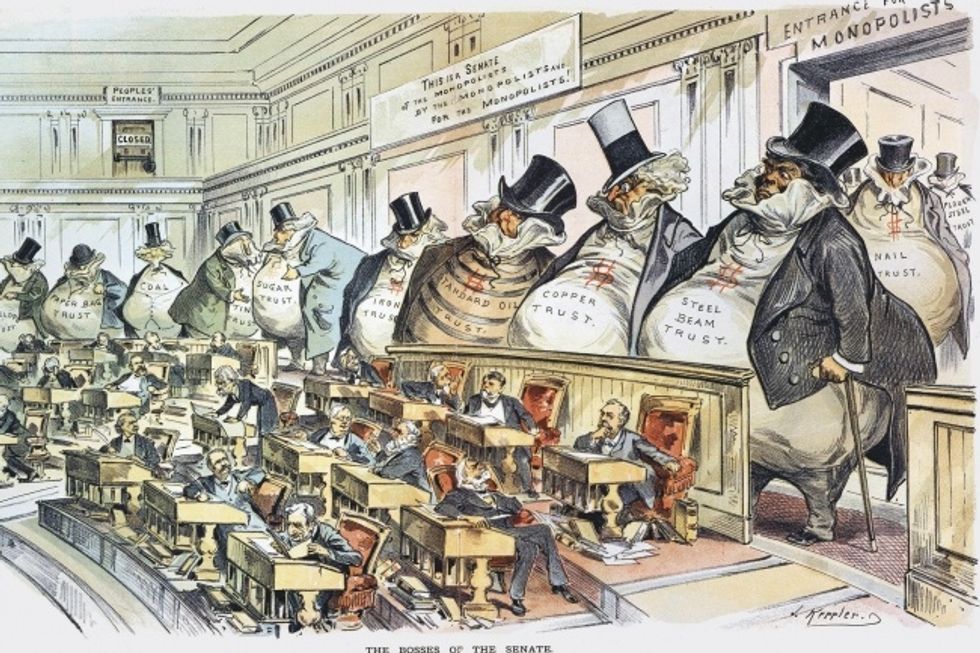Many people are unfamiliar with a period of what is referred to as the Gilded Age.
According to History, the term was originally coined by Mark Twain in his novel A Gilded Age: A Tale of Today in reference to the riotous years following the civil war that led to unprecedented growth in industry and technology, as well as a more prosperous America.
With millions of immigrants and farmers flooding the cities, populations in urban areas like New York and Philadelphia grew rapidly, and by 1900, about 40% of Americans were said to have been living in major cities. Working conditions were poor for the lower-middle class because most cities weren't ready for such rapid growth. Robber barons had controlled major industries such as railroads, oil, tobacco, etc.
Robber barons were men who'd established strong political connections through the use of fraud, violence, and intimidation to gain an advantage over the competition.
Through dominating these industries, these robber barons and other large business owners thrived as the working class was forced to endure long, dangerous days of employment, wage cuts, and no job benefits.
The income inequality in America allowed the wealthy to live lavishly and provide exquisite meals for their families while the poor were sentenced to cramped apartments and struggled to feed their children.
Many respond to the modern gap between the poor and the wealthy as a natural process– with a social Darwinist "survival of the fittest" perspective created by moguls that we've been forced to conform to that presumes the fittest of humans will be most successful, and the poor are destitute because they are dumb and don't work hard enough.
According to an article published by USA Today, America had entered and is currently in a Second Gilded Age sometime around 1990, and our president is the personification of it.
As we sit back and watch the share of income circulate between the top 1% of the richest people in America, we allow for these robber barons – who don't quite fit the description – continue to thrive financially and dominate their ancestors' industries.
Meanwhile, poor families are being displaced because they can no longer afford to live in their homes and the line that divides the working class from the poor is fading.
We've seen generous donations from wealthy populists fighting to close the gap between the wealthy and the poor and champion the disenfranchised, but even so, we still see high wealth inequality on the rise.
When will we draw a line on the parallelism we see between the state of American society during the Gilded Age and that of today's society? We can see clear evidence for the belief that America has entered the Second Gilded Age from similarities in political rhetoric, anti-immigration sentiment, levels of political polarization, and especially wealth inequality among the classes.
The first instance of the Gilded Age in America was followed by a Progressive Era initiated by the people through an array of reforms that alleviated poverty, increased workplace safety, restrained the power of big business, improved health and education, granted women the right to vote and many more ways that have led America down the path of enlightenment.
The time for contemporary American society to repeat this step in history seems to be at hand.
It's our duty as our country's citizens to step up and challenge the vast wealth-accumulators who have gained such massive amounts of money in such short periods of time. Such stupendous incomes are unnecessarily distributed to small groups or individuals that often heedlessly invest their money rather than distributing to families in need or organizations that help the needy.
The time for a second progressive era has come.
- In Second Gilded Age, Trump shows no sign of taking on rigged ... ›
- Are we living in the Second Gilded Age? - BBC News ›
- The Gilded Age has striking similarities with today, but not for the ... ›
- Are We Living in the Gilded Age 2.0 ? - HISTORY ›
- America's Gilded Ages: Then and now, and how they differ ›
- Andrew Carnegie - HISTORY ›
- Chicago Fire of 1871 - HISTORY ›
- Labor Movement - HISTORY ›
- Cornelius Vanderbilt - Biography, Children & Facts - HISTORY ›
- Gilded Age - HISTORY ›
- The Myth of a 'Second Gilded Age' - The Chronicle of Higher ... ›















